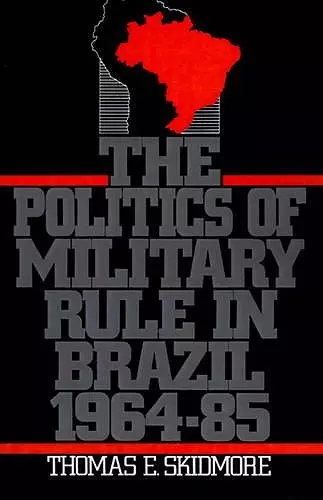The Politics of Military Rule in Brazil, 1964-1985
Format:Paperback
Publisher:Oxford University Press Inc
Published:17th Jun '93
Currently unavailable, and unfortunately no date known when it will be back

The largest and most important country in Latin America, Brazil was the first to succumb to the military coups that struck that region in the 1960s and the early 1970s. In this authoritative study, Thomas E. Skidmore, one of America's leading experts on Latin America and, in particular, on Brazil, offers the first analysis of more than two decades of military rule, from the overthrow of João Goulart in 1964, to the return of democratic civilian government in 1985 with the presidency of José Sarney. A sequel to Skidmore's highly acclaimed Politics in Brazil, 1930-1964, this volume explores the military rule in depth. Why did the military depose Goulart? What kind of "economic miracle" did their technocrats fashion? Why did General Costa e Silva's attempts to "humanize the Revolution" fail, only to be followed by the most repressive regime of the period? What led Generals Geisel and Golbery to launch the liberalization that led to abertura? What role did the Brazilian Catholic Church, the most innovative in the Americas, play? How did the military government respond in the early 1980s to galloping inflation and an unpayable foreign debt? Skidmore concludes by examining the early Sarney presidency and the clues it may offer for the future. Will democratic governments be able to meet the demands of urban workers and landless peasants while maintaining economic growth and international competitiveness? Can Brazil at the same time control inflation and service the largest debt in the developing world? Will its political institutions be able to represent effectively an electorate now three times larger than in 1964? What role will the military play in the future? In recent years, many Third World nations--Argentina, the Philippines, and Uruguay, among others--have moved from repressive military regimes to democratic civilian governments. Skidmore's study provides insight into the nature of this transition in Brazil and what it may tell about the fate of democracy in the Third World.
"Skidmore has written the essential book on contemporary Brazil....Skidmore delivers a remarkably comprehensive, superbly documented, balanced and judicious assessment of Brazil's two decades under military domination."--The Historian
"This volume will quickly establish itself as the authoritative work in English on Brazil under military rule and on the country's gradual transition toward democracy. Assiduously researched and elegantly written, the book combines lucid analysis of economic and social trends with sound political history and balanced judgements."--Foreign Affairs
"Has been acclaimed as, without a doubt, the most comprehensive study of politics in Brazil. This book, however, can also be useful in better understanding the politics of Latin America as a whole."--Journal of International Law and Politics
"A major contribution to our understanding of the period. As always, Skidmore argues his case cognetly and clearly....The great value of this study is that it provides historical depth and extremely useful documentary guidance to an understanding of why, even under the 'New Republic', democratic government remains fragile and vulnerable, and why fundamentally important changes, including agrarian and fiscal reform, were still, in 1989, neglected or resisted."--History
"The most comprehensive account now in English. It will not be superseded soon."--Contemporary Sociology
"Operates splendidly for several reasons. It is easily read, includes a number of political cartoons as well as pictures, and is a reasonalby balanced and objective piece."--Teaching History
"There is no doubt that it will become a standard reference for those interested in Brazilian political history after 1964."--Riordan Roett, School of Advanced International Studies, The Johns Hopkins University
"Quite marvelous--far and away the best modern history of Brazil in English. It is a much needed account of the contemporary experience of this most important of the newly industrialized countries."--William D. Rogers, Arnold & Porter, Washington, DC
"It will, without doubt, be as useful to students trying to understand the background to Brazil's current attempts to establish democracy as Skidmore's early work was to those trying to understand democracy's demise in '64. This book reaffirms Skidmore's position as the preeminent North American commentator on contemporary Brazilian political history."--Peter Evans, University of New Mexico
"This welcome sequel to Skidmore's Politics in Brazil, 1930-1964 treats politics during the rule of an authoritarian military regime from 1964 until the reintroduction of democracy. With an engaging narrative style and careful scholarship Skidmore traces events from the overthrow of the civilian Goulart government to the more recent abertura, political opening to democracy. He describes the economic challenges, the evolution of a national policy of repression and the torture of dissidents...and soberly assesses the prospects for democracy. Highly recommended for general and academic libraries."--Library Journal
"Excellent....Skidmore approaches this complex period with a tightly woven historical synthesis, a wealth of detail, and clear writing....This work is indispensable for academic libraries, a welcome addition to the contemporary literature, and necessary reading for scholars and students of Brazil."--Choice
- Winner of Named an Outstanding Academic Book of 1988-1989 by ^IChoice^R.
ISBN: 9780195063165
Dimensions: 219mm x 155mm x 27mm
Weight: 630g
432 pages